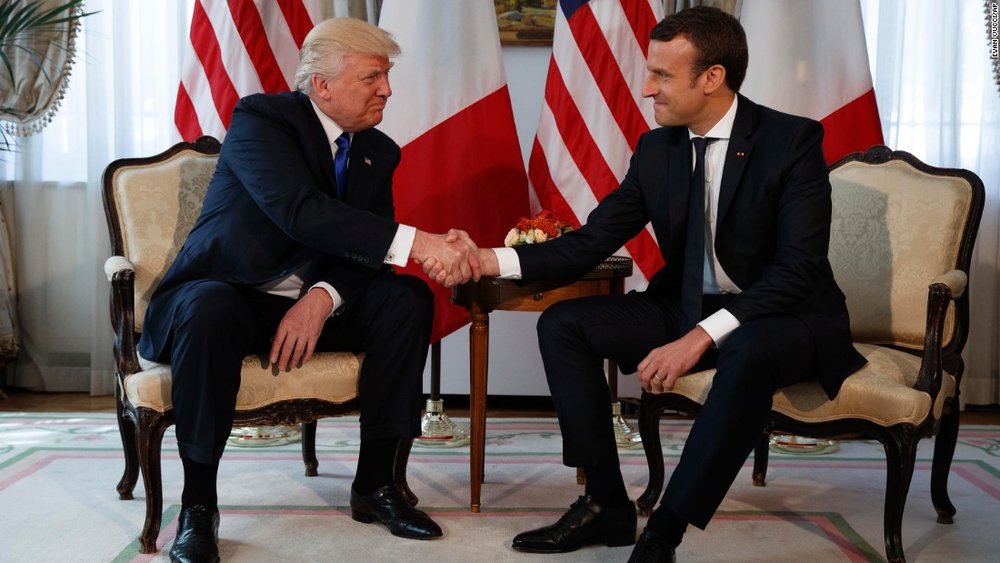Washington and Paris play doubles against Iran

Existing evidence and documents suggest that Donald Trump and Emmanuel Macron, Presidents of the U.S. and France, have sought to redefine policy on the JCPOA.
Last September on the sidelines of the United Nations General Assembly, we saw the joint work of Washington and Paris on how to deal with the nuclear question. Trump and Macron decided to launch and lead the “the JCPOA transformation process” using the U.S. Congress. Macron's remarks on the “possibility of completion of the JCPOA” by including Iran's missile armaments and new constraints on Iran's nuclear program were the proofs of this bilateral agreement between the White House and the Elysée Palace.
Following Trump's controversial speech on the nuclear deal and his two-month time limit to the U.S. Congress to review the JCPOA, Macron continued his negative maneuvers in dealing with Iran’s missile program. But the U.S. Congress could not reach consensus on the matter and U.S. Vice President Mike Pence announced that the Trump administration and the Congress will continue cooperation to revise the JCPOA.
"Now, we’re also working with the Congress to arrive at a new agreement, a new set of conditions for sanctions going forward. The reality is that the nuclear deal was so ill-founded, because it did not deny that Iran could develop a nuclear weapon. Being a 10-year agreement, it virtually guaranteed that they would develop a nuclear weapon after that 10-year period. Whether we’ll continue to waive sanctions will be decided soon,” said Pence.
According to the Vice President, the Trump administration and the Congress are drafting a law stating that if Iran ever resumes its efforts to develop a nuclear weapon and missile to deliver it, all nuclear sanctions will immediately be imposed against Tehran. About three weeks ago, Emmanuel Macron explicitly stated that "the JCPOA” is unchangeable, but he still talks about completing the nuclear deal. What is certain is that completing the nuclear deal means altering this agreement.
Macron himself knows that an annexation, supplementary agreement or even a secondary agreement is a clear breach of the original agreement. In such a situation, the JCPOA will lose its value. There are some points in this regard that need to be addressed.
Firstly, the U.S. officials will first try to agree on a joint plan to "transform the deal”. Over the past two months, Tom Cotton and Bob Corker, two Republican senators, have made great efforts to persuade the Congress to address Donald Trump's concerns, but they failed in this regard. According to the Cotton-Corker joint plan, Iran's missile activities will be linked to the nuclear deal, and if the Islamic Republic prevents the IAEA from inspecting its military sites, the deal will automatically be nullified.
Also, according to their plan, the so-called sunset clauses will be removed, and the restrictions on Iran's nuclear program would be permanent. Democrat Senators believe that the plan will mean the withdrawal of the U.S. from the deal, and therefore they have not agreed with it. Some Republican Senators such as Ron Paul and Jeff Flake are also concerned. Nevertheless, the joint talks between the Congress and the White House on this project continue.
Secondly, the ةlysée Palace is still clinging to the term “completion” of the JCPOA. This is bizarre because Macron also states that the deal is unchangeable, while he wants to incorporate restrictions on Iran's missiles into the deal. What is certain is that the slightest change in the nuclear deal means the other party's failure to fulfill its obligations. In other words, it means the official withdrawal of the P5+1 from the nuclear deal. The insistence on this explicit and decisive stance by the Iranian diplomats can perhaps effectively counterbalance the U.S.-French designs on the JCPOA.
A third point is that it should not be forgotten that Washington and Paris are jointly trying to muck up the nuclear deal. We should not consider Paris and Washington’s game separately. Considering France as a "mediating actor” or "independent actor” would be a mistake. Paris is clearly against the JCPOA and acting as a supporting actor with the U.S. The softer tone of the French authorities should not deceive Iran.
It appears that the French president and his foreign minister are not going to behave in the same way as the previous governments of the country regarding the nuclear deal. Nonetheless, the French continue the same approach of former governments regarding peaceful nuclear activities in Iran.
Leave a Comment